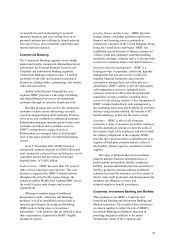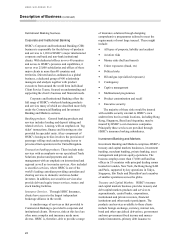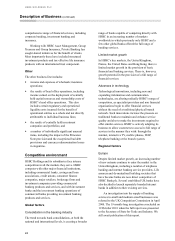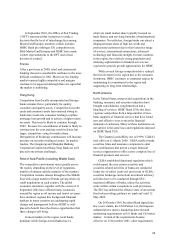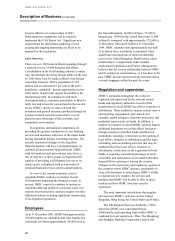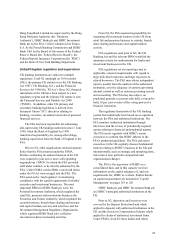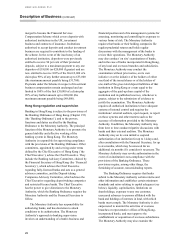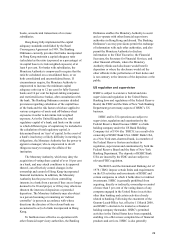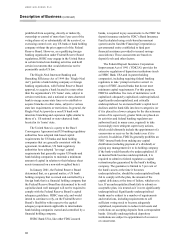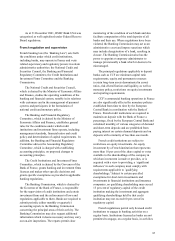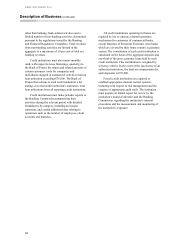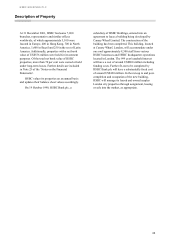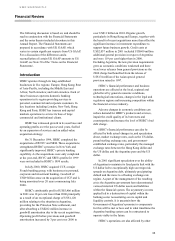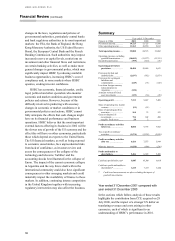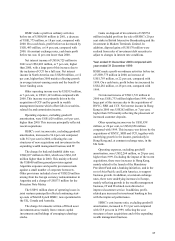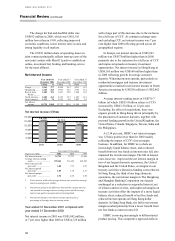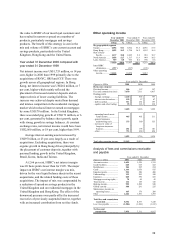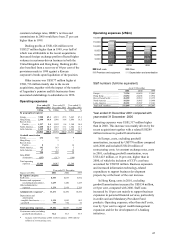HSBC 2001 Annual Report Download - page 33
Download and view the complete annual report
Please find page 33 of the 2001 HSBC annual report below. You can navigate through the pages in the report by either clicking on the pages listed below, or by using the keyword search tool below to find specific information within the annual report.31
As at 31 December 2001, HSBC Bank USA was
categorised as well capitalised under Federal Reserve
Board regulations.
French regulation and supervision
French banking law (the ‘Banking Law’ ) sets forth
the conditions under which credit institutions,
including banks, may operate in France and vests
related supervisory and regulatory powers in certain
administrative authorities: the National Credit and
Securities Council, the Banking and Financial
Regulatory Committee, the Credit Institutions and
Investment Firms Committee and the Banking
Commission.
The National Credit and Securities Council,
which is chaired by the Minister of Economic Affairs
and Finance, studies the operating conditions of the
banking and financial system, notably in its relations
with customers and in the management of payment
systems and participates in the formulation of
national credit and monetary policy.
The Banking and Financial Regulatory
Committee, which is chaired by the Minister of
Economic Affairs and Finance, establishes general
rules for the conditions under which credit
institutions and investment firms operate, including
management standards, financial ratios and credit
policy and determination of capital requirements. In
addition, the Banking and Financial Regulatory
Committee advises the Accounting Regulatory
Committee, which is charged with establishing
accounting principles, on proposed changes to
accounting principles.
The Credit Institutions and Investment Firms
Committee, which is chaired by the Governor of the
Bank of France, grants banking and investment firms
licences and makes other specific decisions and
grants specific exemptions as provided in applicable
banking regulations.
The Banking Commission, which is chaired by
the Governor of the Bank of France, is responsible
for the supervision of credit institutions and certain
investment firms and the enforcement of laws and
regulations applicable to them. Banks are required to
submit periodic (either monthly or quarterly)
accounting reports to the Banking Commission
concerning the principal areas of their activity. The
Banking Commission may also request additional
information which it deems necessary and may carry
out on-site inspections. The reports permit close
monitoring of the condition of each bank and also
facilitate computation of the total deposits of all
banks and their use. Where regulations have been
violated, the Banking Commission may act as an
administrative court and impose sanctions which
may include deregistration of a bank, resulting in
closure. The Banking Commission also has the
power to appoint a temporary administrator to
manage provisionally a bank which it deems to be
mismanaged.
The principal regulations applicable to deposit
banks such as CCF are minimum capital ratio
requirements, equity and permanent resources
(certain long-term assets denominated in euros)
ratios, risk diversification and liquidity, as well as
monetary policy, restrictions on equity investments
and reporting requirements.
CCF’s commercial banking operations in France
are also significantly affected by monetary policies
established from time to time by the European
Central Bank in coordination with the Bank of
France. French credit institutions are required to
maintain on deposit with the Bank of France a
percentage, fixed by the European Central Bank and
calculated monthly, of various categories of demand
and short-term deposits and are prohibited from
paying interest on certain demand deposits and on
deposits with a maturity of less than one month.
French credit institutions are subject to
restrictions on equity investments. An equity
investment by a French institution that represents
more than 10 per cent of the share capital or votes
available to the shareholdings of the company in
which an investment is made or provides, or is
acquired with a view to providing, a ‘significant
influence’ in such company must comply with
requirements applicable to ‘qualifying
shareholdings.’ Subject to certain specified
exemptions for short-term investments and
investments in financial institutions and insurance
companies, no qualifying shareholding may exceed
15 per cent of regulatory capital of the credit
institution making the investment and aggregate
qualifying shareholdings held by that credit
institution may not exceed 60 per cent of its
regulatory capital.
French regulations permit only licensed credit
institutions to engage in banking activities on a
regular basis. Institutions licensed as banks are not
permitted to engage, on a regular basis, in activities


